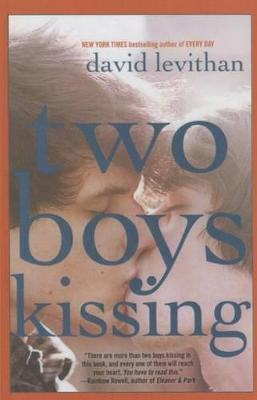I'd seen this book around but wasn't really interested. Contemporary YA isn't my thing. Then I heard last week that it was narrated by the spirits of men who died of AIDS and I had to read it.
I devoured this book in one afternoon. When the husband came home that night I told him that a book made me cry - twice. He was as surprised as I was that a book melted my ice-cold heart.
This is the story of three couples and of a single teenager. Craig and Harry are exes who are looking to set the world record for kissing at over 32 hours. They were inspired by a homophobic attack on their friend Tariq. Craig isn't out to his family.
Peter and Neil have been a couple for over a year. Neil's family is still not acknowledging his homosexuality.
Avery and Ryan just met last night. Avery is trans and is worried about letting Ryan know.
Cooper's family just found out that he is gay and the resulting argument drove him out of the house.
These aren't the stories that got to me though. I think that's because I'm older than the typical YA demographic. It was the narration of the dead men watching these boys openly live their lives in ways that the men of the 1980s couldn't have dreamed of.
"You can't know what it is like for us now -- you will always be one step behind.
Be thankful for that.
You can't know what it was like for us then -- you will always be one step ahead.
Be thankful for that too."
Those are the opening lines of the book and that's when I started getting teary. The passage that made the tears roll down my cheeks is later when Craig and Harry was going into the first night of the kiss. They have teachers watching as official monitors so the record counts. The teacher that is taking over the shift is recognized by the narrators.
"He's Mr. Ballamy to his history students. But he's Tom to us. Tom! It's so good to see him. So wonderful to see him. Tom is one of us. Tom went through it all with us. Tom made it through."
It goes on to tell the story of a man who lost his partner in the first wave of the AIDS epidemic and stayed in the community to nurse others.
"He lost years of his life to us although that's not the story he'd tell. He would say he gained. And he'd say he was lucky, because when he came down with it, when his blood turned against him, it was a little later on and the cocktail was starting to work. So he lived. He made it to a different kind of after from the rest of us. It is still an after. Every day it feels to him like an after. But he is here. He is living.....
.... But this is what losing most of your friends does: It makes you unafraid. Whatever anyone threatens, whatever anyone is offended by, it doesn't matter, because you have already survived much, much worse. If fact, you are still surviving. You survive every single, blessed day."
I would recommend this book to everyone. Younger people will likely identify with the problems of the teens in the story. Older readers, especially those of us who remember the 80s, will think of all of those lost to the disease whose stories were never told.This review was originally posted on Based On A True Story
